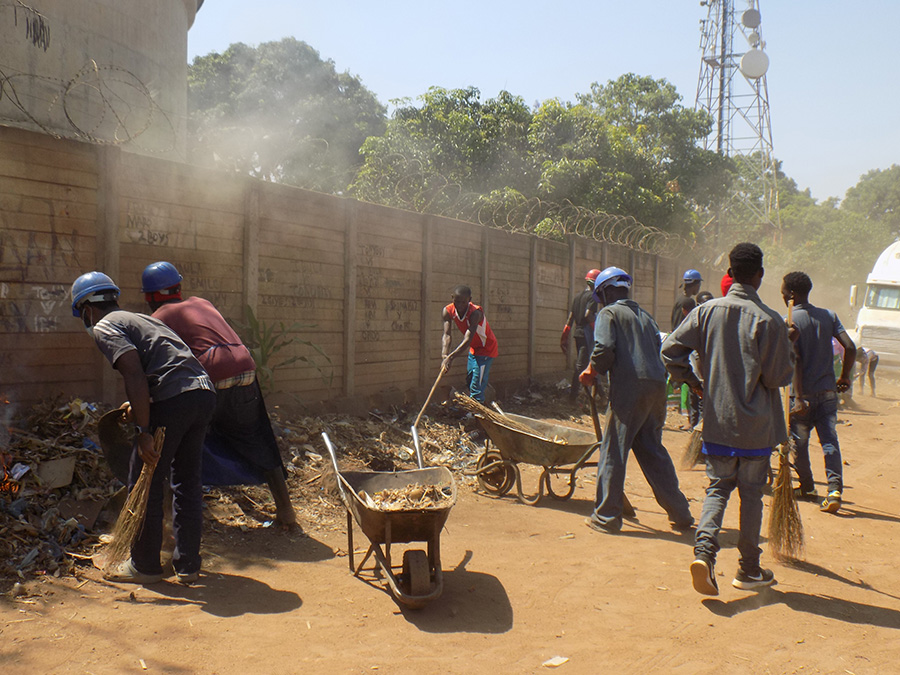“A local NGO in Malawi – the Centre for Community Organisation and Development (CCODE), is supporting groups of organized urban poor communities to improve livelihoods, strengthen resilience to shocks and create jobs for women and youth by investing in skills development. This is a response to the devastating effects of Covid19“
The Covid-19 pandemic began in 2019 as a health crisis but with time it has transformed itself into an economic crisis with particular concerns for the poor. Its side effects have been devastating on education, health, food security, and gender-based violence.
Poor and vulnerable urban communities are struggling with the pandemic’s far-reaching consequences. Building their economic resilience will be key to achieving inclusive cities. As countries and societies are devising ways of building back better, such ways should not forget the poor.
The most effective way to do this is to enable the poor to build their own resilience
The pandemic presents an opportunity for development agencies to seriously consider the importance of enhancing livelihoods resilience for the urban poor. The urban poor is highly vulnerable. Most of them live in marginal and unsafe areas of the city and are reliant on the informal and unpredictable cash economy, while at the same time they face income insecurity.
With the pandemic, most urban communities have suffered economically. People have lost jobs and most businesses have downsized – others have gone under. Most informal traders have lost customers. Households’ incomes have significantly dropped and livelihoods destroyed.
The pandemic has affected the savings culture in Malawi. Markets for small businesses have faltered, the movement of people has faced restrictions and community gatherings are restrained. The majority of members of these groups are women. The primary caregivers. And with the loss of employment for most men (the traditional breadwinners). Women have taken up another role of providing for their families and this has provided an additional burden.
How should the urban poor prepare for the economic threats caused by the covid19 pandemic?
As the pandemic and the jobs crisis evolve, the need to protect the most vulnerable becomes even more urgent. Businesses are barely breathing. They have no savings or access to credit. If they do not receive any help now, these enterprises will perish. No income means no food, no security, and no future.
The Centre for Community Organisation and Development is working with urban poor communities through savings centers to strengthen their livelihoods. At the household and community levels, we have intensified the provision of skills for jobs. This package includes technical skills training, enterprise development support, financial literacy training, and savings promotion. Our constituents; the Federation of the Rural and Urban Poor women and youth are being targeted with various skills pieces of training such as Designing & Tailoring, Masai sandal making. The federation is also being introduced to the manufacturing of various products. So far groups are being trained in peanut butter production and sausage making as there is a huge market for these products. Federation groups are also involved in agri-business. The groups are accessing capital for their businesses from the Mchenga Urban Poor Fund (UPF) – microfinance governed by Federation leaders that provides capital to its members at an affordable borrowing rate. However, with more than 8,000 eligible members the fund is overwhelmed. The fund needs massive recapitalization.
In a country of high unemployment, the skills being provided are creating employment for youth and women. Further, the skills are supporting income diversification and improving savings for the groups of the poor. They are also bridging the supply chain deficits. Skills such as Designing and Tailoring are coming in handy in the production of reusable face masks for sale in the communities and in turn are aiding the Malawi economy by reducing imports of things like masks, peanut butter, and sausages.
The complementary pieces of training in entrepreneurship and business management are provided to the groups are to help with business sustainability and profit margin calculations for the groups.
Skills development strengthens the resilience of poor people. We believe that households with greater resilience will be able to recover more quickly when impacted by stresses, shocks, or disasters. The work of building resilience for the urban poor requires proper targeting to avoid duplication and the building of partnerships.
Purposeful action to save livelihoods during challenging times involves creating systems needed to establish the enabling environment for household’s resilience

We know that skills development on its own will not lead to strengthened livelihoods. The formal system has been too hard on poor people. The system is exclusionary. We know that informal traders face a lot of challenges ranging from limited access to information, poor infrastructure, and financial exclusion. Little effort is being made to solve these challenges. We are advocating for the inclusion of informal traders in the economy. We are empowering informal traders on their rights and duties. We are organizing the informal sector to speak with one voice. This will help in highlighting cases of abuse against informal traders.
Creating an enabling environment will encourage more informal traders to formalize their businesses and contribute more to the economy of their cities and country.
The Centre for Community Organisation and Development is a professional support organization (PSO) for the Federation in Malawi.


